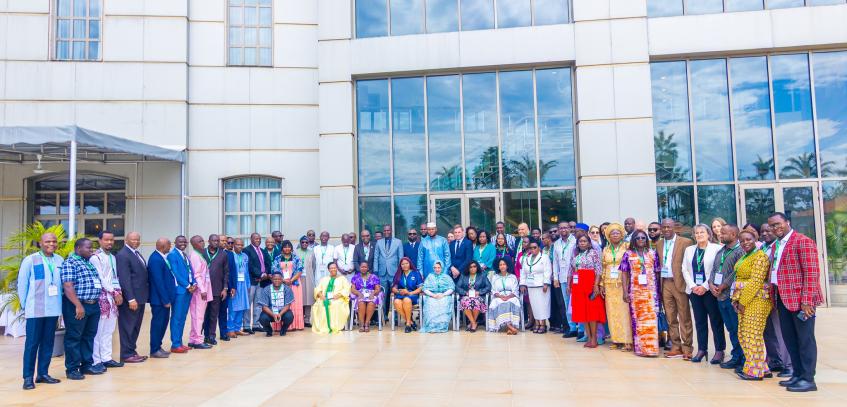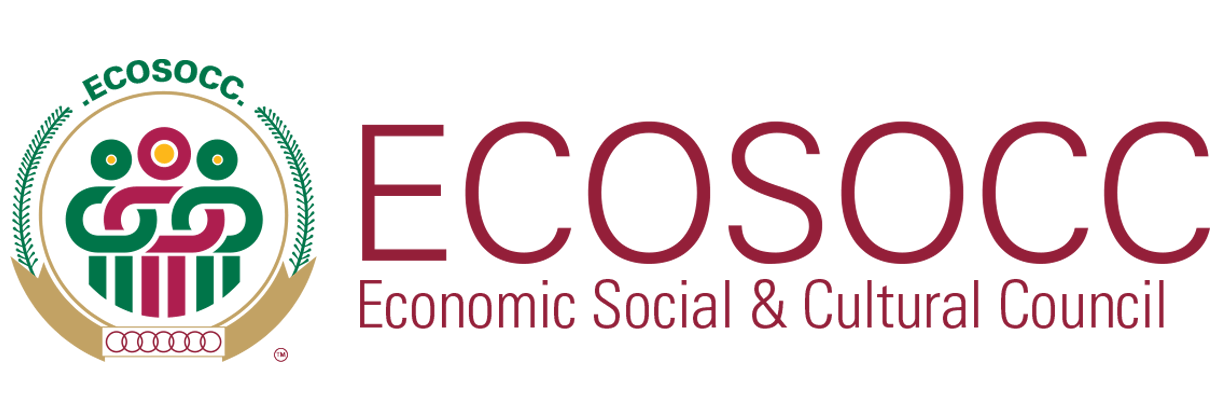The Economic, Social and Cultural Council (ECOSOCC) on 7th July 2025, successfully convened the Civil Society Organisation Inter-Regional Dialogue on Shared Challenges and Opportunities in Peacebuilding, bringing together over 150 participants from across the continent and the diaspora.
The dialogue provided a critical platform for civil society organisations, AU organs, Regional Economic Communities (RECs), faith-based institutions, international partners, grassroots movements, and thematic experts to collectively examine Africa's most pressing peace and security challenges, and to develop actionable policy pathways to strengthen the African Peace and Security Architecture (APSA) and broader continental frameworks.
Opening the meeting, Mr. Louis Cheick Sissoko, Presiding Officer of ECOSOCC, framed the dialogue as a key opportunity to deepen strategic thinking, nurture honest exchange, and advance joint action.
"This is a space created for honest dialogue, strategic thinking, and joint action. The stakes are high, but so is our capacity to meet the moment," he declared, underscoring the indispensable leadership role of civil society from Cabo Delgado to Sudan and calling for stronger integration of youth, women, and community initiatives into AU mechanisms like the APSA.
Mr. Oliver Röpke, President of the European Economic and Social Committee (EESC), emphasized the shared global responsibility to reinforce grassroots leadership in peace efforts.
"From mediation to early warning, civil society isn't a bystander. Peace depends on integrating grassroots expertise into national and continental policymaking," he said.
He further highlighted the ECOSOCC-EESC Memorandum of Understanding as a model for transcontinental collaboration and referencing global financial commitments, such as those emerging from the Financing for Development conference in Seville, as essential instruments to reinforce sustainable peace.
Mr. Kyeretwie Osei, Head of Programmes, ECOSOCC Secretariat, urged participants to appreciate dialogue not merely as conversation but as a structured, purposeful tool of listening and learning that ultimately drives better policy. Drawing lessons from Kenya's post-election reconciliation, Sudan's transitional processes, and the Sahel's community recovery efforts, he stressed that timely, evidence-driven engagement is key to preventing escalation and to anchoring peacebuilding in actual community needs.
Dr. Oita Etyang, Head of Governance, Peace, and Security at the Common Market for Eastern and Southern Africa (COMESA), underscored systemic governance gaps and deteriorating social contracts, warning that broken engagement mechanisms necessitate a profound rethink of how resources are utilized and how Africa prioritises proven, context-specific interventions.
Mr. Boniface Cheembe, Chair of ECOSOCC's Peace and Security Cluster Committee, reminded delegates that social exclusion, inequality, and unresolved grievances transcend borders.
"This forum is a laboratory of ideas where we confront truths and design homegrown strategies," he said, advocating for smarter, community-rooted interventions and robust partnerships.
The Dialogue was officially opened by a distinguished panel that included Ms. Leticia Alene Nsue Asangono, Member of the ECOSOCC 4th Permanent General Assembly; alongside Dr. Etyang, Mr. Cheembe, Mr. Sissoko, and Mr. Röpke. Their opening statements set an ambitious agenda for moving beyond diagnosing Africa's security and governance deficits towards crafting actionable strategies that elevate civil society, reform regional and continental architectures, and reposition Africa as an agenda-setter in global governance spaces. They emphasized people-to-people dialogue, solidarity across linguistic and regional divides, and the urgency of centering African-led solutions to the continent's complex challenges.
Throughout the sessions, participants engaged robustly on topics including the widening disconnect between the AU's principle of non-interference and the need to proactively confront internal governance abuses; the underutilisation of mechanisms such as the African Peer Review Mechanism to hold countries accountable; and the concerning tendency for African conflicts to be mediated or resolved in foreign capitals, eroding local legitimacy.
In a powerful keynote address, Mr. Donald Deya, CEO of the Pan African Lawyers Union traced historical trends from the collapse of the Berlin Wall to present-day manipulations of constitutions by incumbents, calling for Africa to be more audacious in facilitating its own people-to-people dialogues and truth-telling processes for reparative justice.
He underscored the moral contradiction of AU institutions that often selectively uphold or ignore non-interference, weakening the continent's collective ability to respond to crises.
Further sessions explored how civil society organisations including churches and grassroots associations remain critical yet underleveraged actors in peacebuilding. Participants acknowledged challenges within the sector itself, noting that unscrupulous CSOs can compromise broader legitimacy, and called for internal self-policing and integrity pacts.
The Dialogue stressed the need for gender-responsive approaches, lamenting the glaring underrepresentation of women despite their frontline roles in community healing and peace efforts. Strong proposals emerged to institutionalise faith-based early warning systems and ensure women and youth have binding, structured participation in peace processes, not just symbolic inclusion.
There was also a critical examination of the lack of an equally championed "African Development Architecture" to complement APSA and AGA, recognizing that peace cannot be sustainably pursued without robust economic transformation.
A dedicated session on global governance reform challenged Africa's marginalized position in multilateral systems, with participants noting that although over 60% of the United Nations Security Council resolutions concern Africa, Africans rarely shape these decisions. They called for Africa's Peace and Security Council to be positioned as the continent's voice in global security deliberations and advocated for reforms that would address Africa's disproportionate debt burden, unfair global tax systems, and climate injustice, all of which siphon resources from human security and development priorities.
The closing plenary distilled the dialogue into a forceful call for action. Participants resolved that civil society must be recognised as a central pillar in shaping Africa's peace, justice, and governance future. They agreed to prepare a concise policy paper with key recommendations for submission to the AU Assembly, launch targeted advocacy campaigns on Security Council reform ( activation of Article 109) and African debt restructuring, secure AU commitments to gender and youth mainstreaming in all peace processes, and push for a rigorous AU-level review of the Silencing the Guns initiative with direct civil society involvement. More importantly, they pledged to engage African diplomatic missions to build a united front on reforming global governance, advancing Africa's economic agenda, and securing climate reparations.
The outcomes of the Dialogue fed into ECOSOCC's 4th edition of the Citizens' Forum and broader continental processes, ensuring that Africa's vision for a peaceful, just, and resilient future is genuinely citizen-driven.
As civil society leaders departed Malabo, they did so with a renewed collective determination to ensure that Africa's peacebuilding journey is not just informed by declarations but by locally anchored, boldly implemented strategies that reflect the dignity and aspirations of its diverse peoples.








